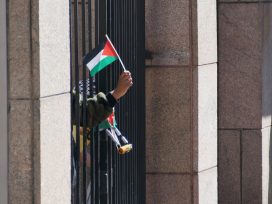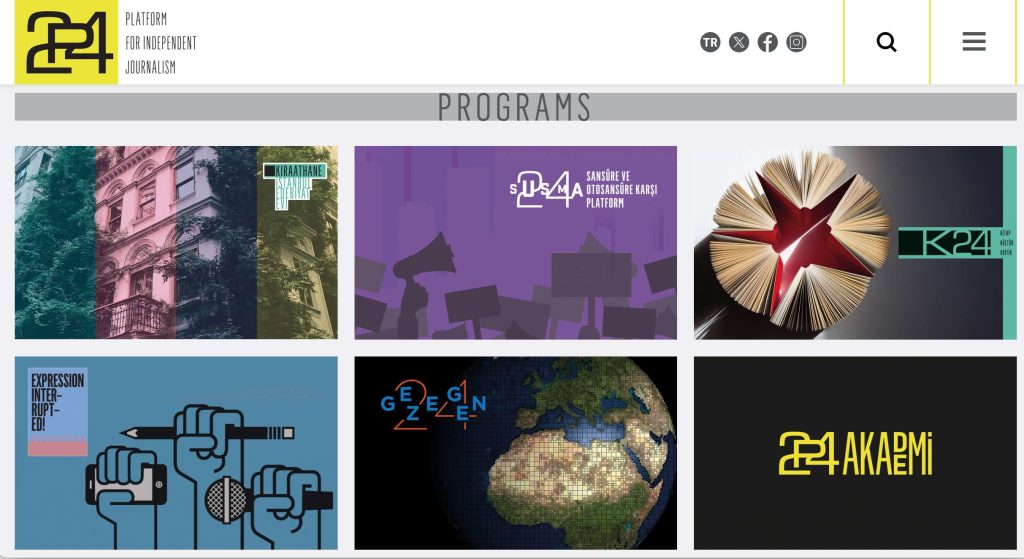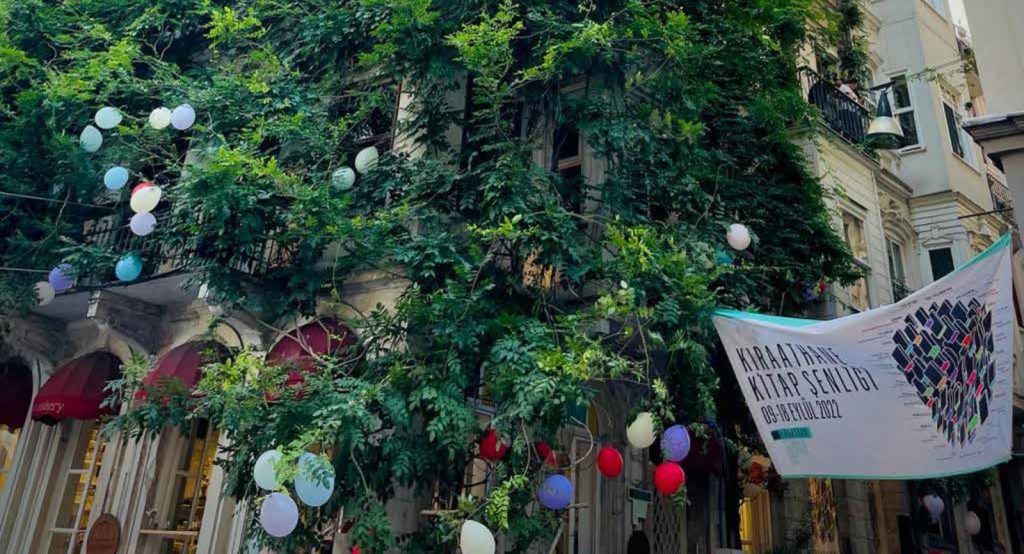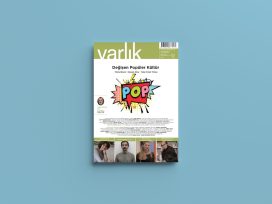
Assaults on academic freedoms in the US mirror those happening in Turkey for the past decade. Erdoğan’s silence about clampdowns on pro-Palestinian speech at US universities, even when Turkish scholars are directly affected, is particularly telling.
State control of the Turkish media is exercised through subordinate and heavily concentrated ownership structures. With barely room left for independent outlets, digital platforms have become a means for journalists in Turkey to continue to provide reliable information.
For one a week in mid-August, Instagram was blocked in Turkey by the state’s internet regulator, the Information and Communication Technologies Authority (BTK), on the instruction of the Presidential Communications Directorate. The official reason given for the block was Instagram’s alleged failure to take necessary measures against content related to so-called ‘catalogue crimes’, including gambling, human trafficking and child abuse.
However, there is speculation that the real reason for the block was Instagram’s removal of posts offering condolences for the murdered Hamas leader Ismail Haniyeh. Those same officials who blocked Instagram also mentioned that negotiations with META (the parent company of Instagram) were progressing positively.
The last time the Turkish government intervened in social media platforms was immediately after the massive earthquakes in February 2023. According to official sources, the earthquakes caused more than 50,000 deaths, making them the deadliest event in the country’s history. The state immediately banned Twitter (since rebranded as X), claiming that it was being used to spread disinformation. This ban occurred even before humanitarian assistance was deployed. It was three days before the government was able to access the earthquake zone.
Both bans were very unpopular. This was especially the case with the ban on Instagram, which was not clearly understood and sparked strong reactions from all segments of society, particularly young people. Over the past fifteen years, the escalating pressure on freedom of expression in Turkey has rarely sparked as much public debate as on this occasion.

https://platform24.org/en/ Copyright P24
The Platform for Independent Journalisms (P24), the organisation of which I am the chairman, runs a programme called Expression Interrupted that monitors government actions that affect freedom of the press and expression. Expression Interrupted’s most recent report describes the current situation in Turkey as follows:
The second quarter of 2024 was a period of continued decline in freedom of expression and freedom of the press in Turkey. During the period covered by the report, the planned addition of a new criminal offense titled ‘agents of influence’ to the Turkish Penal Code (TCK) under the 9th Judicial Package was a major topic of debate due to the threat it would pose to press freedom, academic freedom and freedom of expression in general.
At the very beginning of the period, the Provincial Electoral Board’s decision to revoke the mandate of DEM Party candidate Abdullah Zeydan, who was elected Mayor of Van in the local elections held on 31 March 2024, and to give the post to AKP candidate Abdulahat Arvas, was protested in many cities, and many journalists covering the protests were subjected to violent police intervention, threats and detention.
According to data compiled by Expression Interrupted, there were at least 34 incidents of violent police interventions, physical attacks, threats and targeting of journalists in the three-month period covered by the report.
In the second quarter of this year, impunity practices in favour of the perpetrators of threats and attacks against journalists continued to be among the problems frequently faced by journalists. During the reporting period, courts heard at least seven cases involving journalists as complainants due to violations they were subjected to. While two of these cases concluded with the attackers being sentenced, two defendants who were jailed for carrying out an armed attack against a journalist in Bursa were released by the court at their first hearing.
The decline observed throughout 2023 in the number of imprisoned journalists, a key indicator of judicial pressure on journalists, was interrupted by new arrests in the second quarter of 2024. The number of imprisoned journalists rose to 33 with the arrest of five journalists in April and May. During the reporting period, six journalists were released from prison. As of 30 June 2024, the number of imprisoned journalists in Turkey was 28.
However, the number of imprisoned journalists is not the only indicator of judicial pressure on the media in Turkey. In the period covered, new cases were filed against journalists for their reporting, the books they wrote, interviews they participated in, or for their social media posts. According to Expression Interrupted data, seven new cases were filed against nine journalists and columnists in the three months covered in this report.
The case against journalist Furkan Karabay, who was arrested in December 2023 and released after 10 days, was among the 10 journalism trials that got underway in this period. Karabay, who is possibly facing more court cases than any other journalist in Turkey currently, appeared in courts for 11 different cases during the reporting period. He was sentenced in two of these cases and acquitted in one.
In the second quarter of 2024, 192 journalists stood trial in 101 cases. In 24 cases that concluded, 17 journalists were acquitted while 8 journalists were sentenced to a total of 25 years, 6 months and 15 days in prison and 5 journalists were ordered to pay a total of 62,500 TL in compensation. At least 7 new cases were filed against journalists; 20 journalists were detained and 5 journalists were jailed.
During the state of emergency declared in the wake of the coup attempt in July 2016, a total of 169 media outlets were permanently shut down. Among them were print media and TV channels reportedly associated with the organization responsible for the coup attempt, the religious congregation led by the US-based preacher Fethullah Gülen. However, it is important to note that a significant number of the shuttered outlets were classified as ‘Kurdish media’.
Experienced journalist Aydın Engin, who sadly passed away in 2022, shared the following message with foreign press representatives during a visit to the daily Cumhuriyet in a show of solidarity. This visit took place after 12 of its executives and employees were imprisoned in 2016:
The presence of journalists who are bought by others is not a new phenomenon. It has always existed, not just in Turkey, but worldwide. However, under AKP rule, a threshold has been crossed. Instead of dealing with bought journalists, Turkey’s merchant politicians have resorted to purchasing newspapers and TV channels, creating what we call ‘the pool media’. This involves making the owners of large-scale capital, who receive substantial tenders from the state, buy newspapers and televisions and turning them into the government’s ‘mouthpieces’.
When Engin uttered these words, it was a stark reminder of the sale of Turkey’s media giant Doğan Group, the owner of 20 monthly and seven special periodicals, as well as a total of 80 publications spanning various intervals. The group boasted ownership of popular TV channels such as CNN Türk, Kanal D TV, as well as digital broadcasting platforms Blu TV and D-Smart. Additionally, the group exercised significant control over the broadcast distribution company Yay-Sat, which currently holds a near-monopoly position and is under consideration for divestiture). The sale, which occurred less than a year ago for a staggering $890 million, raised eyebrows when it was uncovered that the transaction had been facilitated by a 14-year loan of $800 million from a state-owned bank. There were also allegations that the buyer had been acting on specific instructions. This revelation sheds light on the intricate web of connections and influences within the media landscape.
Turkey’s media was for categorized by Freedom House as ‘not free’ the first time in 2016. Unfortunately, there has been no improvement since then. On the contrary: over 90% of Turkey’s media are now under the indirect control of the government. According to research published by the Media Ownership Monitoring Project (MOM), jointly prepared by Bianet and Reporters Without Borders, as of May 2019, there were 2,474 newspapers, 3650 magazines, 899 radio stations, and 108 television channels in the media sector in Turkey. The country’s 40 largest media organizations are controlled by companies operating in the fields of industry and trade outside the media sector. These media outlets are often referred to as ‘partisan media’. It is a common occurrence for ten daily newspapers in Turkey, including those considered ‘mainstream’, to use the exact same headline.
Today in Turkey, there are only three and a half newspapers left who do not stand on the side of the government. Even worse, there is just one newspaper that could be described as ‘independent’ in the true sense of the word. The fate of that single newspaper over the last decade is the subject of a documentary film I have been working on for the past five years.
Following the death of its editor-in-chief and de facto director, İlhan Selçuk, in 2010, Cumhuriyet (Republic), initially known for its nationalist leftist stance, underwent a significant shift towards the liberal left. Despite not being affiliated with any organization and being owned by a foundation, established after the death of all members of the founding Nadi family, internal conflicts arose between the old and the new within the newspaper. This transition led the newspaper to adopt a broader perspective on events, at the expense of upsetting traditional Kemalist readers. This shift was exemplified by the recruitment of new writers with affiliations to the liberal left, who were openly critical of Turkey’s Kurdish policy. Can Dündar, a journalist renowned for his left liberal stance via his books, TV programs, and documentaries, was appointed editor-in-chief in February 2015.
During this period, the newspaper boldly published in Turkish the first issue of the French magazine Charlie Hebdo published after the deadly attacks on its Paris offices in 2015. This action was meant to demonstrate a show of solidarity with the magazine and unwavering commitment to the freedom of the press. This generated strong reactions from leaders of the Islamic community, including president Recep Tayyip Erdoğan himself. In response to escalating violent protest, the newspaper’s headquarters found itself encircled by a permanent police barricade.
At the same time, the newspaper continued to step off the Kemalist–nationalist path, despite the board of directors’ persistent affirmations of their commitment to upholding Atatürk’s revolutions and the founding principles of the Republic. Having been closely aligned with Republican People’s Party (CHP) since its foundation, the newspaper began to visibly open up to the voices of other opposition parties, particularly the pro-Kurdish Peoples’ Democratic Party (HDP, in 2023 fused with the Peoples’ Equality and Democracy Party – DEM). The newspaper subsequently solidified its position as the most prominent opposition press entity, providing some counterbalance within a media landscape that continued to echo the position of the ruling AKP. Despite having only a relatively small circulation, it remained a reputable and influential publication.
In May 2015, Can Dündar received a video that had a significant impact. The previous year Turkey had been shaken by the what has been referred to as the ‘intel-trucks’ incident: three trucks, escorted by Turkey’s intelligence agency MIT, had been stopped by the gendarmerie just one hour away from the Syrian border. A standoff ensued between the gendarmerie and MIT personnel, with guns drawn. The intelligence officers were arrested, and the trucks were seized. Subsequently, the governor took over the case and eventually the trucks and MIT personnel were released and crossed the border. The government denied allegations that the lorries had been loaded with weapons. The incident sparked widespread discussion in the Turkish parliament and public sphere.
But the video passed on to Can Dündar depicted the opening of the crates by security forces, revealing weapons concealed under medicine packages in the trucks that were carried to Syria. Stills from the footage made their way onto the front page of Cumhuriyet with the headline ‘Here are the weapons that Erdoğan says do not exist’. In response, Erdoğan vowed that ‘I will not let the person who made that news get away with it’. Six months later, Can Dündar and Erdem Gül, the newspaper’s Ankara bureau chief, were arrested. After three months in prison, they were released by a Constitutional Court ruling.
During one of the hearings, Dündar was the target of an assassination attempt attack. Despite the incident, the court sentenced him to five years and ten months imprisonment and ruled that all his assets be confiscated. Dündar subsequently moved to Germany, where he has remained since. In 2020 he was sentenced in absentia to 27 years and six months imprisonment on espionage charges on espionage charges. Meanwhile, the government had admitted to the fact that the trucks had been carrying weapons, which it insisted were destined for Turkmens (who denied receiving them). Others, however, claimed that the weapons had been intended for jihadist groups in Syria.
On 31 October 2016, there was a new crackdown on Cumhuriyet, resulting in the detention of 15 employees. Nine prominent writers, journalists, and executives, including the chairman of the board of directors Akın Atalay and the new editor-in-chief Murat Sabuncu were arrested. They were accused of being involved with FETÖ, the organization of the US-based preacher Fethullah Gülen, whom the government alleged had orchestrated the coup attempt in 2016, and with the PKK, the Kurdish separatist organization.
The indictment lacked concrete evidence of any criminal offences under Turkish law. Instead, it relied on tenuous connections, such as the association with FETÖ of the relative of a parquet salesman who offered his services to one of the defendants, or a phone call made to a tour company (ironically owned by Turkey’s current minister of culture and tourism) once linked to the organization. Despite the absence of substantial evidence, journalists were imprisoned for up to one-and-a-half years. After a two-year trial, 15 journalists were sentenced to terms ranging from three to eight-and-a-half-years. Cumhuriyet’s lawyers appealed to the Supreme Court twice, but their appeals were rejected.
The former board members of the Foundation that owns the newspaper declared their extreme displeasure at its growing distance to Kemalism. Those who failed to get re-elected for the board in 2013 provided testimony against the newspaper during the prosecution of Cumhuriyet, ironically serving Erdogan’s ends. The General Directorate of Foundations, whose administrators are appointed by bureaucrats affiliated with the ruling AKP, then made a significant and unprecedented decision: that the Cumhuriyet foundation’s previous board election in 2013, which had been approved at the time despite objections, was not in conformity with the legal framework.
This ruling led to a change in the management of the newspaper on 7 September 2018, with the previously deselected board members again taking over. The following day, the newspaper’s front page prominently featured headline ‘Atatürk’s Cumhuriyet’ to point out its return to the traditional Kemalist path. As a result of the board takeover, nearly 40 journalists and executives resigned from the newspaper. While Cumhuriyet today remains the only independent print daily, its oppositional position now takes a narrower republican angle.
The transformation in the Turkish media has left thousands of journalists unemployed. For instance, 375 journalists were laid off when Hürriyet, once the newspaper with the highest number of readers in the country, was sold in 2018 to Demirören Holding, a conglomerate close to Erdogan. Many of the unemployed journalists, particularly those new to the profession, have sought opportunities in other fields. A substantial number of experienced or determined journalists have transitioned to digital platforms.
It would not be wrong to assume that the independent media in Turkey are predominantly followed by those looking for an alternative coverage of current affairs who want be sure that the news are fact-checked. However, like everywhere else, YouTube and Instagram are the most common ‘news sources’ in Turkey, with X in third place. Traditional media has declined in popularity and the future of true journalism and its sustainability is uncertain.
Our association, P24 Platform for Independent Journalism, is a non-governmental organization that has been supporting independent journalism for the past 11 years. In addition to promoting press freedom, the organization also advocates for freedom of expression, freedom of artistic expression, and initiatives to expand these freedoms across all segments of society. It was started with a broad mission to build capacity in the Turkish media, create a public appetite for media independence, and define and promote best journalistic practice.
P24 run various projects to support independent journalism, freedom of expression, to resist censorship and self-censorship, or at least to make censorship and anti-democratic practices visible. Susma (Speak Up) is a platform set up to stand against restrictions to freedom of expression such as censorship, self-censorship, bans, blocking, isolation, defamation or social lynching to which individuals and associations active in cultural life, the arts and the media are subjected. It aims to empower everyone in Turkey whose freedom of expression is threatened and who values the right to obtain news and information, the arts, literature – in short, any form of expression.
Expression Interrupted is a website launched by P24 to keep track of jailed journalists and academics in Turkey. It aims to provide timely and reliable information on freedom of expression cases and developments and keeps track of the ongoing trials.
K24, another ongoing project of P24 is an online book review (K for kitap/book – ed.). Its motto is books, culture and criticism. It is not a commercial publication. Another project is Kıraathane Istanbul Literature House. Seminars, workshops, readings are held in Kıraathane; many young and talented artists hold their exhibitions in its spaces. Since the Kıraathane Literature House is non-commercial, it can host many interesting and political works that commercial galleries don’t. Additionally, a small flat of the Kıraathane Istanbul Literature House in the building of P24 is reserved for writers and artists; a cosy residence.

Kiraathane Istanbul. Image copyright Kiraathane
All these projects are carried out with the help of international grants. It is not possible for P24 to reach domestic funds. Private philanthropy is a tradition that has not been established among the bourgeoisie in Turkey; then there is the fact that private foundations fear sanctions were they to support an organization such as P24 that is critical of the government’s limitation of human rights and freedom of expression.
Local governments could be expected to support cultural initiatives such as K24 and Kıraathane. Especially after the victory of opposition parties in Istanbul and other cities, who won around 60 percent of the chairs in the last local elections. However, there are two obstacles to this: first, centralism has become widespread at every level in Turkey, where government has turned into a one-man regime. Moreover, both the government and the opposition see culture as a money issue. Opposition-held metropolitan municipalities prefer to create companies and new institutions that are extensions of themselves, rather than supporting existing cultural institutions and initiatives that have proven their sustainability. In addition to controlling the flow of money, this creates a political and cultural control mechanism.
After the culture pages in the mainstream media disappeared, and literary and art magazines began closing down, K24 or Kıraathane have been able to fill the spaces left vacant. Publishing and distributing a printed magazine is almost impossible due to the chronic distribution problem and monopolies in the country. In such an environment, K24 and Kıraathane continue their niche existence as small but effective centres of opposition or points of resistance.
P24 occupies a five-storey building that has stood for more than twelve decades in one of the most historical neighbourhoods of Istanbul. There is a beautiful view of Golden Horn through a narrow street with art nouveau buildings across the upper floor windows. May be next time, we will talk about this romantic scenery. This time, since I still can, I chose to tell you about another view from that window.
This article was commissioned as part of Come Together, a project leveraging existing wisdom from community media organization in six different countries to foster innovative approaches.

Published 14 October 2024
Original in English
First published by Eurozine
© Mustafa Ünlü / Eurozine
PDF/PRINTSubscribe to know what’s worth thinking about.

Assaults on academic freedoms in the US mirror those happening in Turkey for the past decade. Erdoğan’s silence about clampdowns on pro-Palestinian speech at US universities, even when Turkish scholars are directly affected, is particularly telling.

In Varlık: how northern cultural hegemony is being challenged by Bollywood, Korean television dramas, K-pop and Nollywood; also, post-emotional human relationships and the aesthetics of uncertainty.